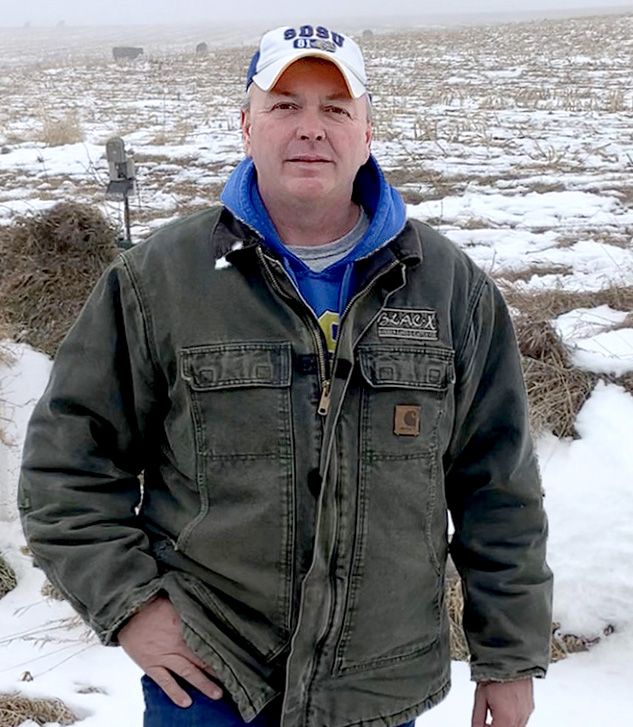
Smithfield Foods closed its Sioux Falls pork processing plant over the weekend after more than 230 workers tested positive for coronavirus.
The plant is one of the nation’s top pork processors, and it has many in the ag sector worried about food supply chains.
“It is impossible to keep our grocery stores stocked if our plants are not running,” said Smithfield President and CEO Kenneth Sullivan in a statement. “These facility closures will also have severe, perhaps disastrous, repercussions for many in the supply chain, first and foremost our nation’s livestock farmers.”
The Sioux Falls facility processes roughly 14,000 hogs per day, and its closure left suppliers scrambling for alternate pork buyers.
“It’s not good,” said Kevin Barnhart, Rock County Pork Producers president. “The sooner we can get Smithfield back online, the better … before the next plant goes down.”
Barnhart, Luverne, works for Schwartz Farms, Rock County’s largest hog supplier, which trucks thousands of animals per week from Rock County barns to Smithfield.
“Where will they go? Good question,” he said Monday.
In addition, several other local operations truck finished hogs to Smithfield.
The hogs that were en route to Sioux Falls when the plant closed Sunday went to other processors in the region, such as JBS in Worthington, Tyson in Storm Lake, Hormel in Austin and Prime Pork in Windom.
But these plants are already operating over capacity to absorb other truckloads intended for Smithfield, which is closed for at least two weeks.
Barnhart supports closing the plant for human safety, but he sees the backside of the hog market when a processor that large is shut down.
In addition to farming out loads to other processors, he said growers have suddenly put the brakes on production.
“We’ve adjusted rations to maintenance levels to slow growth so we can buy ourselves a week or two,” Barnhart said. “We’re also co-mingling weaned pigs with larger animals and double-stocking the nursery.”
None of these options are ideal, because most swine barns operate on finely tuned biosecurity for animal health. When it’s compromised, Barnhart said, there’s more risk for disease.
The other alternative, which he said local growers haven’t opted for, is to euthanize piglets and cull weaker animals to cut production.
The hope, Barnhart said, is to maintain production flow (rather than stop altogether), because disruptions take time to overcome, and inefficiencies cost money. And most pork producers can’t survive any more losses.
“I hope we don’t lose any independent producers because of this,” Barnhart said. “It’s not one thing. It’s a buildup of things. And it’s not just hogs. … When our farmers don’t do well, we don’t do well in Rock County. We live and die on the backs of our farmers.”
Coronavirus impact hits all sectors of farm economy
The Smithfield plant closure and closures of large processors in the United States have all livestock producers — not just pork producers — nervous.
Beaver Creek cattle farmer Peter Bakken said the coronavirus effect on the farm economy is already disastrous in terms of decrease demand due to closed restaurants and school kitchens.
But he said the nail in the coffin for livestock growers would be the closure of meat plants.
“While everyone else is sheltering in place, we’re still calving, and we’re going ahead with spring planting. … And we’re telling people the food supply is safe,” Bakken said.
“But if you take away the processors … It’s not like I can deliver a steer to your front yard and say, ‘Here’s your beef.’ You’re going to see a disruption in the supply chain.
As president of Rock County Farm Bureau, Bakken was interviewed in an April 3 national press call with a dairy farmer from Idaho and a produce grower in Florida.
The 25-percent crash in the cattle market after coronavirus closures resulted in a million dollar loss to his family’s operation in a few weeks’ time.
“It’s very frustrating that we’ve worked so hard, yet we have no control over whether we can recover from this loss,” Bakken told the national press. “I consider myself to be a well-established farmer and even for me this is going to be a major hit. It would be that much tougher if you were just getting started.”
He said the interview was an opportunity to give voice to agriculture.
“It was a perspective for consumer awareness,” he said. “You don’t miss the well until the water runs dry. … To a certain extent the country is now aware, ‘Our food doesn’t come from the grocery store.”
And he said people are learning about the interconnectedness of economies.
“The consumer is pleased about gas prices, but the trickle down of that is that the ethanol people aren’t employed anymore and the farmer can’t move his grain anymore because there’s no demand,” Bakken said.
“It’s business as usual on my farm from a health standpoint, but the health of my business is more impacted than the health of my respiratory system.’
The $2.2 trillion CARES Act stimulus law provides $9.5 billion to U.S. Secretary of Agriculture Sonny Perdue to provide financial support to farmers and ranchers, as well as $14 billion for the Commodity Credit Corporation.
The aid package includes help for food banks, which farmers would like to supply, but Bakken said just getting product out of the field and onto the shelves may cost more than some can afford.
“If I’m a produce grower, just to donate it, I have to pick it, package it, put it on the truck and pay my employees,” he said. “I have to pay to go to work. If I don’t do anything with it, at least I get zero.”
Premium Minnesota Pork still on track for May startup
Meanwhile, Premium Minnesota is still on track to start processing 2,500 hogs per day at the Luverne plant that’s undergoing a $30 million retrofit and expansion.
May 4 was the planned start date, but CEO Dan Paquin said it will open when it’s safe to do so.
The parent company, Lynch Livestock, operates Premium Iowa Pork in Hospers Iowa, where workers are prepared to accept Luverne’s antibiotic-free pork if need be.
Those employees are temperature-checked at the start of their shifts and regularly cleaning their work areas — in addition to taking hand sanitizer home to their families. “Everybody’s working on staying safe,” Paquin said.
In addition, he said the Hospers plant has been diligent about not allowing visitors or vendors in the building and employee temperatures are taken as they show up for their shifts.
He said the Smithfield Foods coronavirus spread is taken seriously in his industry, but for smaller operations, prevention is more manageable.
“We have 400 employees — not 3,700 – that’s a huge difference. Our groups are pretty intimate, so we are better able to visit with our employees,” he said. “If you don’t feel well, don’t come to work.”
He said coronavirus measures may delay the start of processing in Luverne, but the plant will be ready the first week in May, and many management employees are already hired.
He also said he’s not worried about hiring 200 employees on short notice. “There will be plenty of people looking for jobs,” he said. “And we have good-paying jobs.”


